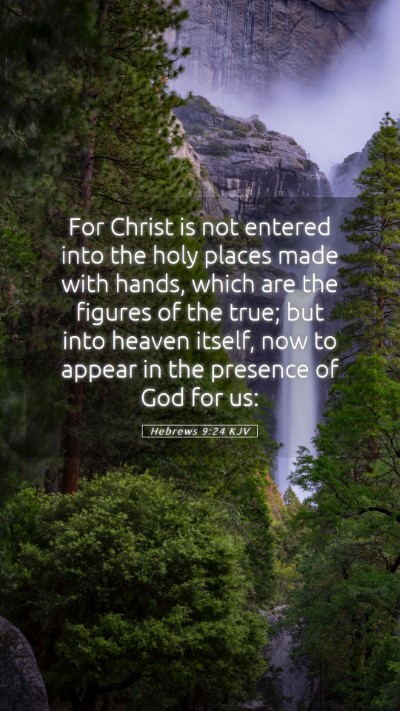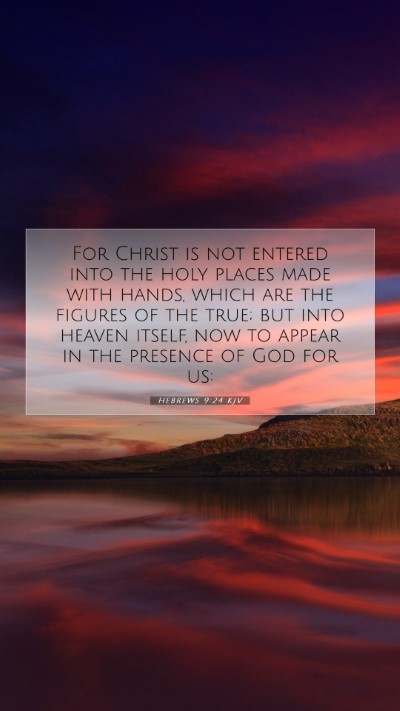Understanding Hebrews 9:24
Hebrews 9:24 states, "For Christ did not enter a sanctuary made with human hands that was only a copy of the true one; he entered heaven itself, now to appear for us in God’s presence."
This verse encapsulates significant theological themes regarding the nature of Christ’s role as a mediator and the difference between the earthly tabernacle and the heavenly realm.
Bible Verse Meanings
To grasp the meaning of Hebrews 9:24, we can draw insights from several public domain commentaries:
- Matthew Henry's Commentary:
Henry interprets this passage by emphasizing that Christ did not enter a man-made sanctuary, which represented the limitations of the Old Covenant. Instead, He entered the divine presence in heaven, signifying His unique role in fulfilling the redemptive plan. His entry is seen as an assurance of His ongoing advocacy for believers before the Father.
- Albert Barnes' Notes:
Barnes reflects on the contrast between the earthly sanctuary, which was merely a shadow of what was real, and the actual sanctuary in heaven. He explains that Christ’s entrance signifies the completion of His sacrificial ministry. Barnes points out that while the high priest of the Old Testament had to enter the Holy of Holies annually, Christ’s entry was once for all, showcasing the efficacy of His sacrifice.
- Adam Clarke's Commentary:
Clarke elaborates on the idea that the earthly tabernacle was a mere figure or imitation of the true heavenly one. He highlights the importance of understanding the heavenly realities that Christ has entered into and how this connects to the larger narrative of atonement in Scripture. Clarke notes that through His presence in heaven, believers have direct access to God’s grace and mercy.
Bible Verse Interpretations
The verse can be interpreted in several layers:
-
Typological Significance: This verse highlights the typological relationship between the Old Testament sacrificial system and Christ’s ultimate sacrifice. The earthly sanctuary represents a foreshadowing of Christ's heavenly ministry.
-
Advocacy of Christ: Christ stands as an advocate in the presence of God on behalf of believers, indicating His intercessory role, which reassures Christians of their acceptance before God.
-
Access to God: Many interpretations emphasize that through Christ’s actions, believers now enjoy direct access to God's presence, marking a radical shift in the relationship between humanity and the divine.
Scripture Analysis
Analyzing the historical context of Hebrews 9:24 provides further understanding:
-
Historical Context: The Epistle to the Hebrews addresses Jewish Christians, highlighting their relational shift from the Old Covenant to the New Covenant through Christ. This context is crucial for understanding the significance of Christ’s role as described in this verse.
-
Theological Implications: The implications of Christ’s heavenly entry present essential theological concepts regarding grace, redemption, and salvation, contrasting sharply against the ceremonial practices of the Jewish faith.
Application of Hebrews 9:24 to Daily Life
Applying this verse to daily life encourages believers to:
- Rest in the assurance that Christ represents them before God, providing peace and comfort.
- Recognize the significance of their relationship with God as direct and available through Christ.
- Engage in worship knowing that they are participating in a new covenant established by Christ's blood.
Cross References
This verse relates to several other passages in Scripture that deepen our understanding of Christ's priestly ministry:
- Hebrews 4:14-16: Emphasizes Jesus’ high priesthood and our access to the throne of grace.
- Hebrews 10:19-22: Discusses the confidence believers have to enter the Most Holy Place through the blood of Jesus.
- 1 John 2:1: Points to Christ as our Advocate with the Father, further establishing the idea of His intercessory role.


